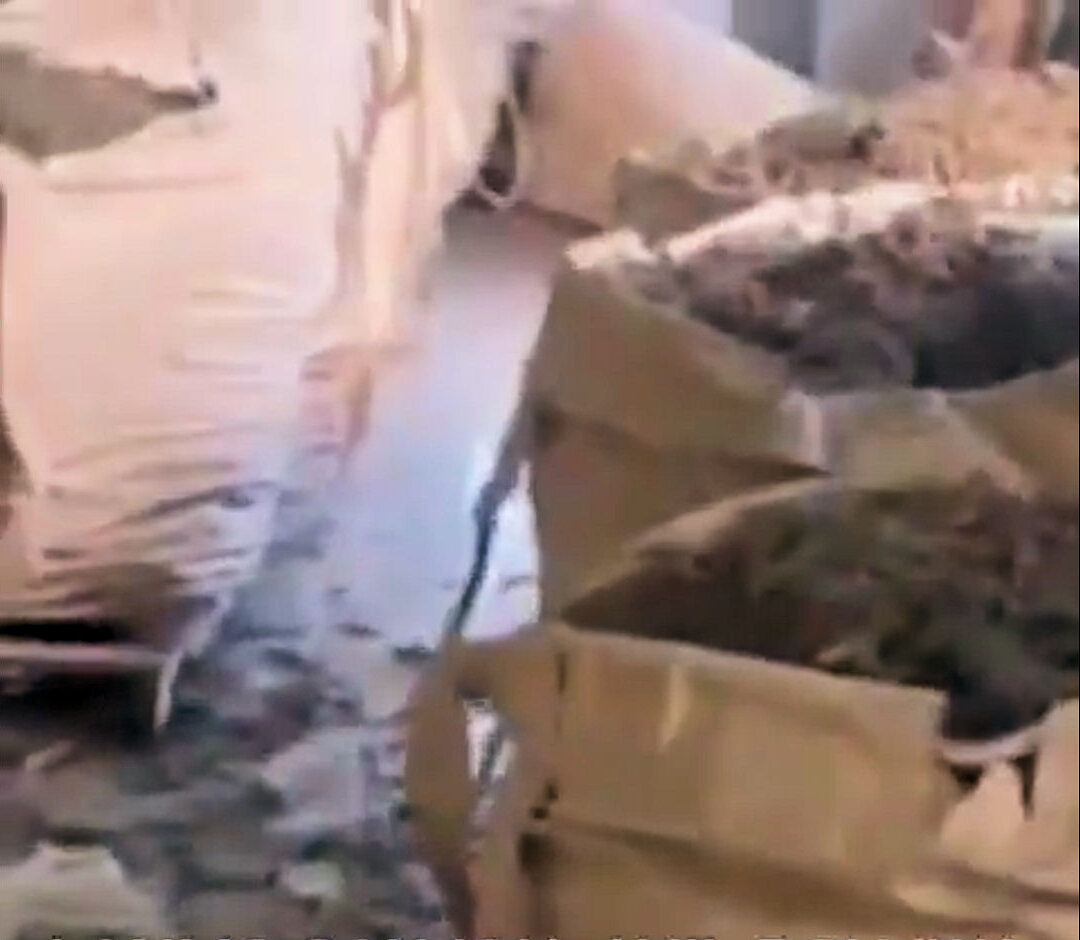On Nov. 10, Joseph “Lanmò Sanjou” Wilson, leader of the 400 Mawozo armed group based in Croix des Bouquets, accused the Apaids, a prominent Haitian bourgeois family, of manufacturing and trafficking illegal drugs, including marijuana and cocaine, as well as human organs.
Wilson, also nicknamed Plip-Plip and Bawon Laplèn (Baron of the Plain), issued a video which his soldiers filmed after entering a large hangar-like facility which held dozens of sacks of what looked like either marijuana or hemp, both of which are illegal in Haiti.
Also filmed were large boxes of dried tobacco leaves, distillation equipment and vats, a sack of unidentified white powder, and a deep cement pit which appeared to have human remains at its bottom.
The latter two items may have been why Wilson also accused the Apaids of trafficking cocaine and human organs.
Andy Apaid – whose family established, owned, managed, and grew rich off of several assembly factories in Port-au-Prince beginning in the late 1970s – became internationally famous as the leader of the “Group of 184,” a U.S.-supported opposition coalition which was central to the 2004 overthrow of elected president Jean-Bertrand Aristide.
Wilson acquired at the raided factory compound the U.S. passports of several of Andy Apaid’s children, photographs and videos of which Haïti Liberté has viewed online. These are some of the “documents” that Wilson claims prove his charges against the family.
The explosive footage begins with an aerial drone shot of the alleged drug factory, over which Wilson explains that “I announced to the Apaid family and all its acolytes that I would go after them, because some people always say that the Viv Ansanm only attacks poor people but never the bourgeoisie.” Viv Ansanm (Live Together) is a coalition of armed neighborhood groups around the greater Port-au-Prince area.
He claimed that the Apaid “family has more than 80 carreaux [255 acres] of land” in Croix des Bouquet’s Lilavois region (about eight miles northeast of Port-au-Prince), and that “helicopters land there and take the drugs to various other countries.”
“And they call me a terrorist,” he said scornfully. “THEY are the terrorists… but once you are rich in this country, you are never wrong,… and that’s why I have attacked the Apaid family.”
Wilson then noted that “pot is illegal in this country,” and “if the police catch some young guys smoking pot, they beat them and put them in prison. What kind of country do we live in? … Because they are producing pot in Croix des Bouquets, in Lilavois.”
Before the footage showing the Croix des Bouquet factory his forces entered, Wilson also filmed a long statement, in which he stated that “I know I will die” and “Apaid will eat me no matter what” because “those guys are the country’s masters” and will be upset at his revealing their apparently illegal enterprise. He challenged Haiti’s de facto authorities to come to his house “to take the 57 sacks of pot [seized at the factory] that I am holding to see if it’s not pot, you bunch of bluffers,” adding that “rich people are never judged.”
At this writing, the Apaid family has made no statement about the raid or even if it is the property’s owner. Nor has the de facto Haitian government made any declaration. Therefore, until now, there is no confirmation for all of the allegations in Wilson’s video, which went viral on Haitian social media. Dozens of people reproduced the video, and multiple livestreams and online debates discussed it.
In one exchange, an anonymous woman from Haiti’s bourgeoisie argued to writer and social media figure Kervens Louissaint that one must make a distinction between hemp and marijuana, both deriving from the cannabis sativa family but being very different plants biologically, the former producing mainly CBD and the latter THC, which gets one “high.”
“The real issue here is not whether the plantation was hemp or marijuana,” Louissaint responded. “It’s about the privilege of opacity. In Haiti, the poor man’s ‘crime’ is the rich man’s ‘enterprise.’”
Wilson vowed that he, with the support of the Viv Ansanm alliance, would fight back against the violent retaliation that he seems certain will come, but concluded almost with resignation.
“I’m now 32, so I have lived too long,” he said. “I may die today or tomorrow… I used to steal a lot and do a lot of crimes, but now, no… If the Baron of the Plain dies, he died for the truth.”
Update: 1 day later the Haitian National Police (PNH) conducted an armed operation, including helicopters, with intentions to take the seized evidence. The attack was held back and one helicopter was shot down.


